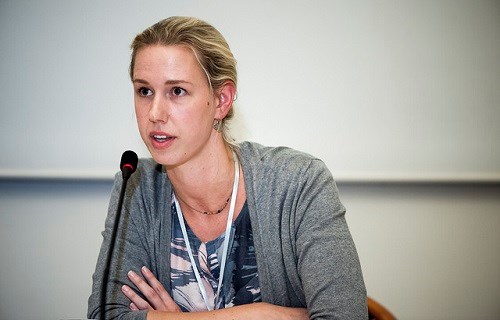Mega-events in Brazil: Not all party for the citizens

Claudia Sanen from the University of Hamburg speaking at Play the Game 2015. Photo: Thomas Søndergaard/Play the Game
12.01.2016
By Ditte ToftWhen cities and countries bid for major sports events such as the Olympics or the football World Cup there is no shortage of the positive effects of hosting the event. But when it comes to showing results on the promises that are meant to lead to a sustainable legacy of the event it is in many cases harder for the national and local governments to deliver.
The session ‘Brazil: The permeable fortress and the road to Rio’ at the Play the Game 2015 conference gave insights on some of the downsides that hosting the football World Cup in 2014 and the Olympics in 2016 have also entailed.
The Brazilian freelance journalist Juliana Barbassa and sociologist from the University of Hamburg, Claudia Sanen, gave presentations on the favelas in Rio and the evictions of thousands of people.
According to Claudia Sanen, 67,000 families have been evicted from their homes from 2009 to 2013. For 13,000 of these families, the evctions have been directly linked to mega-events.
“Even for Rio de Janeiro standard, that is a very high number. Most of the families are from favelas and many of them are relocated far outside the city centre,” said Claudia Sanen.
That situation is far from the promises given in the 2016 Olympics bidding process. Leading up to the mega-events, promises from politicians have led to expectations among the Brazilian people for improvements of public transportation, security, social inclusion and urban upgrade among other things.
One of the major promises made by politicians was meant to benefit the many citizens living in Rio de Janeiro’s favelas. The program 'Morar Carioca' had a goal to urbanise all of Rio’s favelas by 2020 bringing sewerage, electricity and running water to the favelas which would result in a major improvement of the living conditions for many citizens.
But parallelly, a program that would remove favelas was presented only two month after Rio was chosen as the 2016 Olympics host. According to Juliana Barbassa, 19,000 families in the Rio favelas have lost their homes instead of getting better living conditions as promised.
“They are moved from what we in Rio call the south central area which is actually on the east where the jobs are concentrated in Rio de Janeiro and the cluster on the western area, which is Rio’s real-estate frontier where the prices are really blooming. So you are basically taking the poorest population of Rio from the area with the greatest jobs and greatest transportation network, greatest infrastructure and you are moving them to the far west which is the area with the fewest amounts of jobs, most devoid of transportation and infrastructure of any sort,” said Juliana Barbassa in her presentation.
The police serves the state and not the citizens
Another consequence of both the 2016 Olympics and the 2014 World Cup is an increased level of security in Brazil.
Erasmus+ fellow in the Joint Doctorate in Cultural and Global Criminology at Hamburg University, Dennis Pauschinger, presented the results of his study into security in Rio de Janeiro leading up to, during and after the World Cup.
“There is a gap between the way the Brazilian authorities have framed how they have significantly improved their local security dynamics in Rio and what actually happens on ground level,“ said Pauschinger.
The politicians wanted to make security visible, giving a feeling of security, but in fact it did not provide increased security and on the ground level – among the Rio citizens little have changed regarding improved security.
Another major security issue is the huge number of killings made by the police in Rio. Elizabeth Martin from the campaign ‘Don’t kill for me. Safe games for all’ spoke about the high number of killings by the police – compared to the USA, the police in Brazil kills at a rate that is five times higher.
“With language policies such as resistance followed by death, which is essentially 'license to kill', the high rate of killings, and police freedom from punishment when civilians die, all points to a subtle form of permission. They claim they are fighting crime when they kill a pickpocket,” said Martin in her presentation.
The mega-events lead to a further increase in the number of killings by the police. Elizabeth Martin presented concrete numbers that showed how the streets had been cleaned up leading up to the 2014 World Cup. From 2013 to 2014 there was a 45 percent increase in the number of persons killed by the police in Brazil, and in Sao Paolo the increase was as high as 138 percent.
But how about the international sports federations that have awarded Brazil the 2014 football World Cup and the Rio 2016 Olympics? Do they have a responsibility to speak up?
According to Dennis Pauschinger, the problem is that the international sports federations have no interest in making Brazil accountable for the killings and using the mega-events as an excuse for an increase in security.
“These international sports federations are not having any interest in making any pressure on any governments. As long as the IOC president stands on the Copacabana beach saying that Rio will be a more equal city and everybody is cheering and applauding internationally and just repeating this message, I don’t see that there is any effort of containing these kinds of policies,” said Pauschinger.
More information
Watch the video streaming of the session ‘Brazil: The permeable fortress and the road to Rio’
Download presentations from the session ‘Brazil: The permeable fortress and the road to Rio’:





